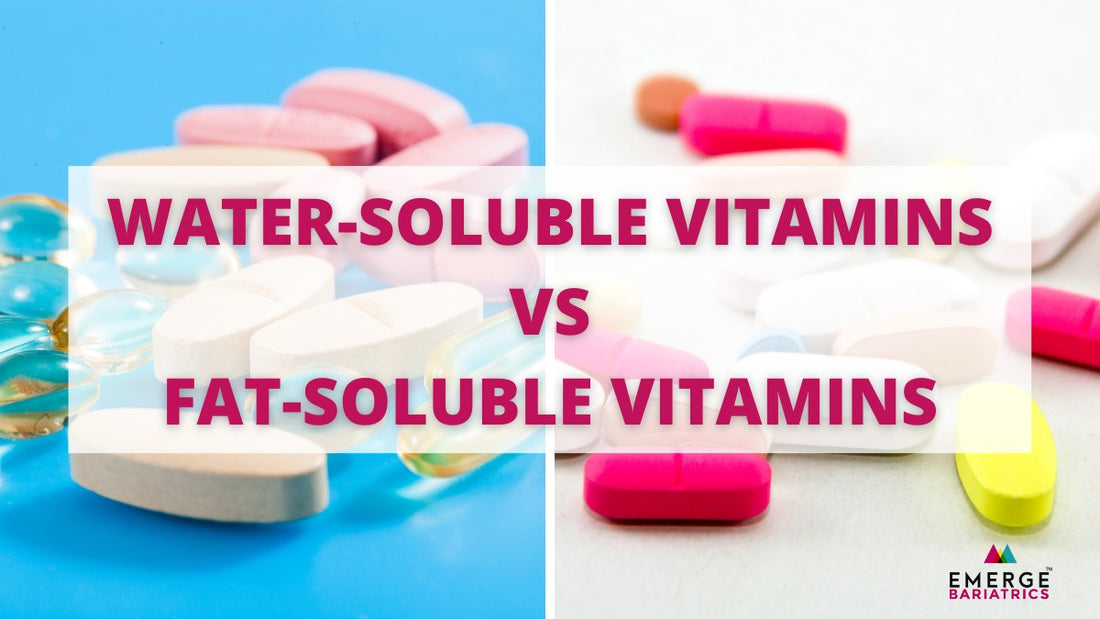All vitamins fall into two categories: fat-soluble and water-soluble. Knowing what vitamins fall into each category can help you make the right nutritional choices to avoid deficiencies after bariatric surgery.
What are vitamins?
Vitamins are organic compounds found in food that are necessary for your body to function properly. These micronutrients are needed for immunity, metabolism, growth, development, and overall health.
What are fat-soluble vitamins?
Fat-soluble vitamins are absorbed with fat from the food you eat. When they are absorbed, they are transported and stored in adipose tissue and liver cells. Since they can be stored, it is more difficult for you to become deficient in these types of vitamins compared to water-soluble vitamins. Fat-soluble vitamins can be stored in your body for up to 6 months. Here is a list of fat-soluble vitamins and their roles in the human body:
- Vitamin A - Important for vision, immune function, and skin health.
- Vitamin D - Needed for calcium absorption, bone health, and immune system.
- Vitamin E - Maintains skin health and eyes and provides antioxidant protection.
- Vitamin K - Essential for blood clotting and bone metabolism.
Common Food Sources
- Vitamin A - Sweet potatoes, spinach, kale, liver, eggs, carrots
- Vitamin D - Sunlight exposure, fatty fish, eggs, fortified dairy products
- Vitamin E - Nuts, seeds, spinach, broccoli
- Vitamin K - Kale, leafy greens, broccoli, meat, brussel sprouts
Fat-soluble vitamins are absorbed with fat from your diet, so it is more efficient to take them with your meals.

What are water-soluble vitamins?
Water-soluble vitamins dissolve in water and are not stored in the body like fat-soluble vitamins. When consumed them, they enter your bloodstream, and your body only absorbs what it needs. Everything else is then released through urine. Here is a list of water-soluble vitamins and their main functions in the human body:
- Vitamin C - Involved in collagen production, wound healing, and antioxidant protection.
- B-Vitamins (B1, B2, B3, B5, B6, B7, B9, 12) - Help the body use macronutrients from food as energy, form red blood cells, and maintain nerve function.
Since water-soluble vitamins can not be stored for long periods of time, they should be consistently included in your diet to avoid nutritional deficiencies.
Common Food Sources
- Vitamin C - Citrus fruits, strawberries, kiwi, bell peppers, broccoli.
- B-Vitamins
- B1 - Pork, nuts, seeds, beans, peas, whole grains
- B2 - Dairy products, leafy greens, meat, almonds
- B3 - Peanuts, whole grains, meat, mushrooms
- B5 - Whole grains, avocados, mushrooms, broccoli
- B6 - Fish, poultry, bananas, nuts, potatoes
- B7 - Egg yolks, nuts, seeds, sweet potatoes, liver
- B9 - Leafy greens, legumes, citrus fruits
- B12 - Meat, fish, dairy products, eggs
Wrap Up:
Water-soluble and fat-soluble vitamins have different forms of absorption. Water-soluble vitamins are absorbed from the blood when needed, and the rest is excreted. Fat-soluble vitamins need fat to be absorbed and are stored in your body for as long as six months. All vitamins are important for overall health and body function.
Related Blogs:
